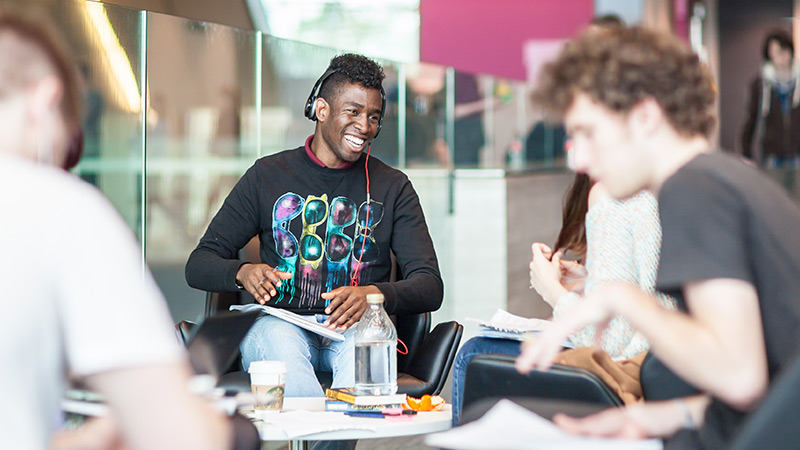Criminology and Education Studies (joint honours)
BA (Hons) or BSc (Hons)
Key facts
UCAS code
LX33
Start dates
September 2026
Location
Course length
Full time: 3 years
Part time: up to 6 years
UCAS Tariff Points
112
Overview
Do you want to make a real difference to young people’s lives and to the society we live in? Studying Criminology and Education Studies at Oxford Brookes prepares you for a career where you’ll change children’s lives.
You’ll explore some of the most topical issues facing children and youth today. You’ll learn how young people learn and develop - physically, cognitively and emotionally.
You’ll also specialise in Criminology - becoming an expert on the issues and systems that can affect troubled young people. You’ll examine policing, drugs, criminal justice and digital crime. You’ll explore how gender, race and class can create unique forms of discrimination.
You’ll graduate prepared for a career working with youth - whether that’s working with young offenders, in education services or within the juvenile justice system.

How to apply
Wherever possible we make our conditional offers using the UCAS Tariff. The combination of A-level grades listed here would be just one way of achieving the UCAS Tariff points for this course.
Standard offer
UCAS Tariff Points: 112
A Level: BBC
IB Points: 27
BTEC: DMM
Contextual offer
UCAS Tariff Points: 88
A Level: CCD
IB Points: 24
BTEC: MMM
Entry requirements
Specific entry requirements
Please also see the University's general entry requirements.
English requirements for visas
If you need a student visa to enter the UK you will need to meet the UK Visas and Immigration minimum language requirements as well as the University's requirements. Find out more about English language requirements.
Pathways courses for international and EU students
If you do not meet the entry requirements for this degree, or if you would like more preparation before you start, you can take an international foundation course. Once you enrol, you will have a guaranteed pathway to this degree if you pass your foundation course with the required grades.
If you only need to meet the language requirements, you can take our pre-sessional English course. You will develop key language and study skills for academic success and you will not need to take an external language test to progress to your degree.
Terms and conditions of enrolment
When you accept our offer, you agree to the Terms and Conditions of Enrolment. You should therefore read those conditions before accepting the offer.
Credit transfer
Many of our courses consider applications for entry part-way through the course for students who have credit from previous learning or relevant professional experience.
Find out more about transferring to Brookes. If you'd like to talk through your options, please contact our Admissions team.
Application process
Full time Home (UK) applicants
Apply through UCASPart time Home (UK) applicants
Apply direct to the UniversityInternational applicants
Apply direct to the UniversityFull time international applicants can also apply through UCAS
Tuition fees
Questions about fees?
Contact Student Finance on:
Tuition fees
Please note, tuition fees for Home students may increase in subsequent years both for new and continuing students in line with an inflationary amount determined by government. Oxford Brookes University intends to maintain its fees for new and returning Home students at the maximum permitted level.
For further information please see our tuition fees FAQs.
Tuition fees for International students may increase in subsequent years both for new and continuing students.
The following factors will be taken into account by the University when it is setting the annual fees: inflationary measures such as the retail price indices, projected increases in University costs, changes in the level of funding received from Government sources, admissions statistics and access considerations including the availability of student support.
How and when to pay
Tuition fee instalments for the semester are due by the Monday of week 1 of each semester. Students are not liable for full fees for that semester if they leave before week 4. If the leaving date is after week 4, full fees for the semester are payable.
- For information on payment methods please see our Make a Payment page.
- For information about refunds please visit our Refund policy page
Additional costs
Please be aware that some courses will involve some additional costs that are not covered by your fees. Specific additional costs for this course are detailed below.
Optional costs
| Additional costs | Amount (£) |
|---|---|
It’s your responsibility to cover print / binding costs where coursework submission is required. Please note that a lot of the coursework is now submitted online. |
From £30 |
| You may choose to purchase books to support your studies. Many books on our reading lists are available via the Library, or can be purchased secondhand. | £20-60 per book |
Accommodation fees in Brookes Letting (most do not include bills) |
£94-265 per week |
Accommodation fees in university halls (bills included, excluding laundry costs) |
£135-200 per week |
Graduation costs include tickets, gowning and photography. Gowns are not compulsory but typically students do hire robes, starting at £41. |
Typically £0-200 |
Students are responsible for their own travel to and from university for classes. For the 2025/26 academic year, the University is introducing an alternative subsidised travel offer for all students with further information on our Travel webpages. |
From £10 |
Funding your studies
Financial support and scholarships
Featured funding opportunities available for this course.
All financial support and scholarships
Learning and assessment
In your first year, you’ll build a foundation in Education Studies and Criminology. You’ll learn how children’s brains develop. You’ll explore key debates in education - like learning at home. You’ll also examine issues in Criminology - like why people commit crime and how the criminal justice system works.
In your second year you’ll broaden your study. You might explore how children learn through play or examine inclusive learning or even how gender stereotypes can impact teachers and learners. You’ll deepen your understanding of Criminology, studying crime through the lens of gender, race and class. You’ll have the chance to do a placement or work-based learning activity.
In your final year, you’ll have the freedom to delve into your interests. You might explore prison systems or examine how technology can enhance learning. You might study drugs, and the relationship between drug use and morality. You’ll also be able to write a dissertation on a subject that fascinates you.

Study modules
Teaching for this course takes place face to face and you can expect around 7 hours of contact time per week. In addition to this, you should also anticipate a workload of 1,200 hours per year. Teaching usually takes place Monday to Friday, between 9.00am and 6.00pm.
Contact hours involve activities such as lectures, seminars, practicals, assessments, and academic advising sessions. These hours differ by year of study and typically increase significantly during placements or other types of work-based learning.
Please note: As our courses are reviewed regularly as part of our quality assurance framework, the modules you can choose from may vary from those shown here. The structure of the course may also mean some modules are not available to you.
Learning and teaching
You’ll learn through a variety of formats, helping you build broad and confident knowledge of Education Studies and Criminology. Your learning will include:
- lectures
- seminars
- tutorials
- enquiry-led learning
- workshops
- online activities.
Assessment
Assessment methods used on this course
You’ll be assessed via a number of different methods, giving you lots of opportunities to showcase your talents. Assessment methods can include:
- essays
- case studies
- critical reviews
- portfolios
- exams
- observational studies
- individual or group presentations.
After you graduate
Career prospects
You’ll finish this course ready to launch a career supporting young people. You’ll have a strong understanding of issues and systems affecting troubled youth. You’ll be equipped with knowledge and skills to work in children’s services, youth outreach, alternative education or even juvenile justice.
Further study
You’ll emerge with the subject knowledge and research skills to pursue postgraduate study - in areas like Law, Business or Humanities. Your degree could also lead to professional courses in areas like social work or psychology.
Additional language modules
Our university-wide language programme is available to full-time undergraduate and postgraduate students on many of our courses, and can be taken as a credit on some courses.
Related courses
Information from Discover Uni
Full-time study
Part-time study
Programme changes:
On rare occasions we may need to make changes to our course programmes after they have been
published on the website. For more information, please visit our
changes to programmes page.
